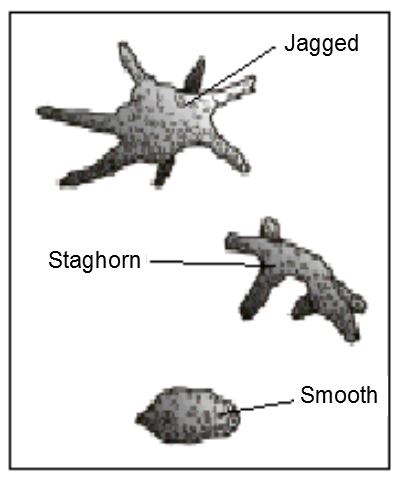Kidney Stones
What are kidney stones?
When urine becomes concentrated, calcium, uric acid or struvite stones may form. Most people simply excrete these crystals in their urine. In a small amount of people, the crystals stick together and form stones. Urine normally has chemicals that stop stones forming, but for some people these chemicals don't work properly.
Stones are more common in men. The first stone usually occurs in the 20 to 40 year old age group. Stones are also more common in tropical regions where either excessive sweating or a lack of good water availability (and therefore intake) leads to a lower urine output. Some metabolic and inherited conditions can also be associated with stones. Some stones are associated with urine infections.
Stones grow in many different shapes and sizes.
Diagnosis
Common symptoms of stones include:
- Pain - usually severe, which can come and go in waves. It may be felt in the back, side of stomach or groin.
- Blood seen when passing urine
- Urge or discomfort with passing urine
- Nausea or vomiting
- Fever
Stones will be diagnosed through an ultrasound, x-ray or CT scan of your abdomen.
Treatment
Infected or painful stones need surgery to remove the stone. Antibiotics may be used to keep the urine free from bacteria that could lead to stone regrowth.
More information about the treatment options available at Urology Associates can be found below:
- Ureteroscopy and laser of stone
- Extra-corporeal shock wave lithotripsy (ESWL)
- Percutaneous nephrolithotomy (PCNL)
Following stone surgery, it may be necessary to remove a stent that has been placed in your ureter (the tube that drains the kidney to the bladder). This can often be removed yourself at home, or one of our nurses can assist if you wish. Click here for information on stents and stent removal.
Prevention
Once someone has had a stone, they are more likely to have a subsequent stone in the future, making prevention very important.
Fluid
Increasing fluid intake is very important. Most people who form stones do not drink enough fluid. Water is the best fluid to drink. Your urine should be a pale yellow colour when you are drinking enough. Drinking more in the summer months or when working or sweating is important.
Diet
Some stones may respond to reducing the amount of salt and acidic foods in the diet such as meats, fish and poultry.
Oxalate
The intake of oxalate containing foods may need to be reduced. Spinach, rhubarb, strawberries, nuts, beetroot, chocolate and tea are high in oxalate.
Vitamin supplements
B vitamins do not cause stones. High intakes of calcium-containing vitamin C, vitamin D and fish liver oil all increase kidney stone formation in some people.
Medications
Medications to prevent further stones may be used. Infected stones need surgery to remove the stone and antibiotics may be used to keep the urine free from bacteria that may lead to stone regrowth.
Your urologist may suggest you use a medication that makes your urine less acidic (more alkaline) - this increases the pH of the urine and helps reduce the formation of certain types of stones.
Enquire with Confidence
We treat all enquiries with compassionate and confidential care. We will aim to answer your questions and direct you to the best health care professional for your needs.


